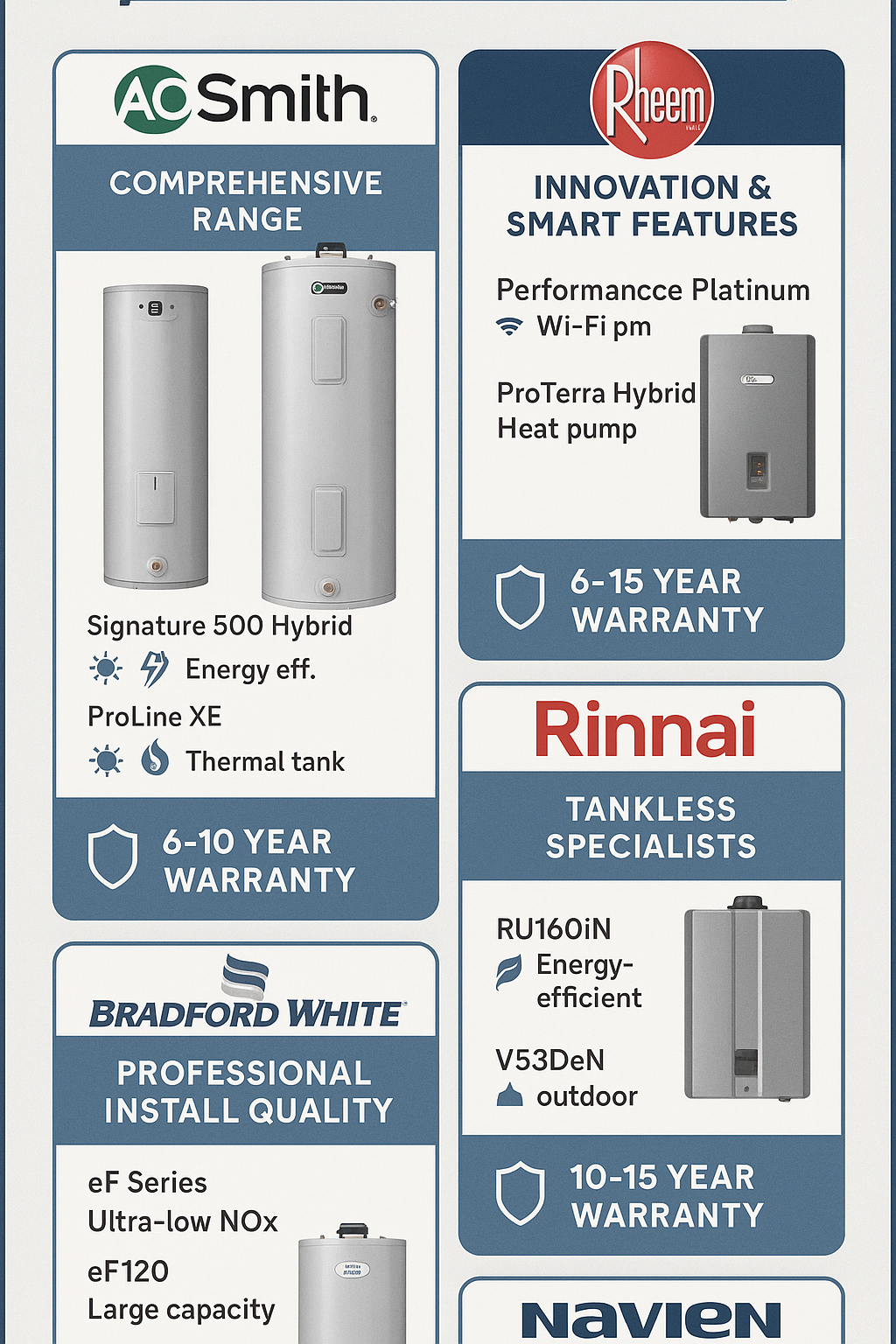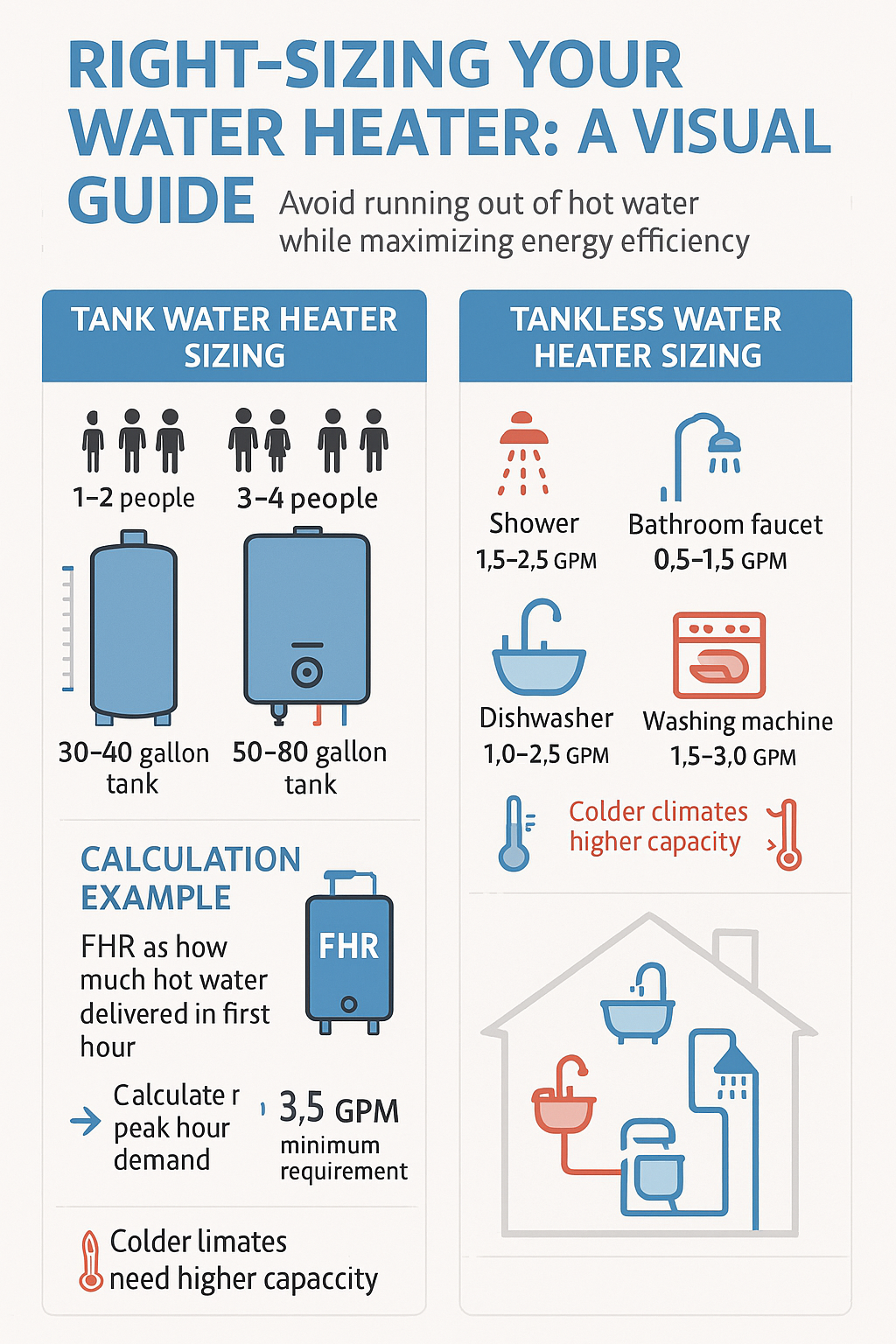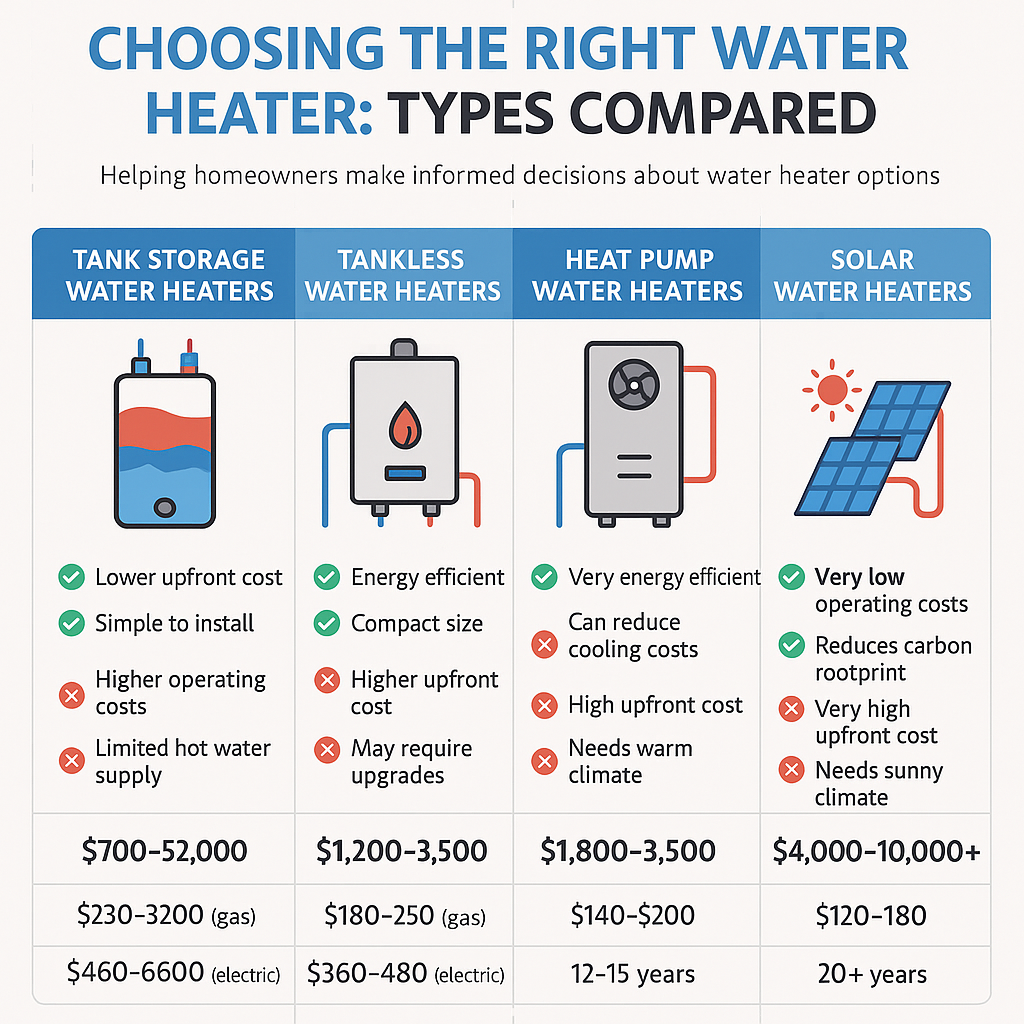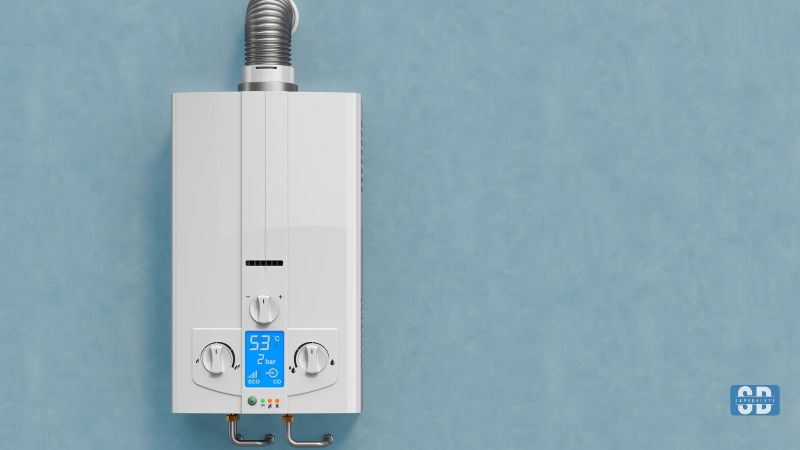Hot water is essential to modern living, powering everything from morning showers to clean dishes and laundry. In the United States, water heaters (commonly called geysers in some countries) are crucial household appliances that often go unnoticed until they stop working. Choosing the right water heater can significantly impact your comfort, utility bills, and environmental footprint.
This comprehensive guide explores everything you need to know about selecting the best water heater for your home in 2025, including the latest technology, top brands, energy efficiency considerations, and practical buying advice.
Understanding Water Heater Types: What’s Best for Your Home?
Before diving into specific recommendations, it’s important to understand the different types of water heaters available and their respective advantages.
Tank Storage Water Heaters
Traditional tank water heaters remain the most common type in American homes. These units store and heat a specific amount of water (typically 30-80 gallons) and maintain that temperature until the water is needed.
Pros:
- Lower upfront cost compared to tankless models
- Simple technology that’s familiar to most plumbers
- Good for households with simultaneous hot water needs
- Available in electric, natural gas, and propane models
Cons:
- Limited supply of hot water (can run out during heavy usage)
- Higher energy costs due to standby heat loss
- Larger physical footprint requiring dedicated space
- Shorter lifespan (typically 10-15 years)
- Potential for leaks and water damage as units age
Tankless Water Heaters
Tankless or “on-demand” water heaters heat water directly as it flows through the unit, eliminating the need for a storage tank and providing hot water only when needed.
Pros:
- Endless supply of hot water (never “runs out”)
- More energy-efficient, potentially saving 24-34% on energy costs
- Longer lifespan (typically 20+ years with proper maintenance)
- Compact size, saving valuable space
- Reduced risk of water damage from tank leaks
Cons:
- Higher upfront cost for purchase and installation
- May require upgraded gas lines or electrical systems
- Limited flow rate (may struggle with multiple simultaneous uses)
- Complex installation often requiring professional expertise
- Higher maintenance requirements to prevent mineral buildup
Heat Pump Water Heaters
Heat pump water heaters use electricity to move heat from the air or ground to heat water, rather than generating heat directly.
Pros:
- Extremely energy-efficient (up to 3x more efficient than conventional electric)
- Significant long-term cost savings on utility bills
- Environmentally friendly operation
- Eligible for generous rebates and tax incentives
- New technology supported by recent federal efficiency standards
Cons:
- Higher upfront cost than traditional electric models
- Requires installation in spaces with adequate air flow
- Works best in warmer locations (efficiency decreases in cold environments)
- Makes some noise during operation
- Longer recovery time between heating cycles
Solar Water Heaters
Solar water heating systems use the sun’s energy to heat water, typically with a backup conventional heater for cloudy days or high-demand periods.
Pros:
- Lowest operating cost of all water heater types
- Environmentally friendly and renewable energy source
- Significant federal tax credits and local incentives available
- Long lifespan (20+ years for quality systems)
- Ideal for sunny climates
Cons:
- Highest initial investment
- Weather-dependent performance
- Complex installation requirements
- Needs adequate roof space with proper orientation
- Requires backup conventional heating system
Top Water Heater Brands in the US Market for 2025

When it comes to choosing a water heater, brand reputation matters significantly. Here are the top-rated water heater brands in the United States based on reliability, performance, efficiency, and customer satisfaction:
A.O. Smith
A.O. Smith has established itself as one of the most trusted water heater manufacturers in America. Founded in 1874, the company offers a comprehensive range of residential and commercial water heaters, including traditional tank, tankless, and hybrid heat pump models.
Why Choose A.O. Smith:
- Extensive product lineup covering all major water heater technologies
- Industry-leading warranties (6-12 years depending on model)
- Innovative features like self-cleaning systems and smart connectivity
- Strong reputation for reliability and longevity
- Excellent customer support and widely available replacement parts
Popular Models:
- Signature 100 Series (tank): Reliable performance with 6-year warranty
- ProLine XE Hybrid: Energy-efficient heat pump technology
- ATI-540H-N: High-efficiency tankless model with impressive flow rate
Rheem
Rheem is another industry leader with a history dating back to 1925. Known for innovation and quality, Rheem offers water heaters in all major categories and has pioneered smart home integration.
Why Choose Rheem:
- Comprehensive range of models across all price points
- Industry-leading energy efficiency ratings
- Innovative features like leak detection and smartphone connectivity
- Excellent warranty coverage (6-12 years depending on model)
- Made in USA manufacturing for many product lines
Popular Models:
- Performance Platinum Hybrid Electric: Highly efficient heat pump technology
- Professional Prestige Series: Premium gas tank water heaters
- EcoNet-enabled models with smart home integration
Bradford White
Bradford White focuses exclusively on water heating products and is known for exceptional quality and reliability. The company only sells through professional installers, ensuring proper installation.
Why Choose Bradford White:
- American-made quality with focus on professional installation
- Exceptional durability and reliability ratings
- Advanced safety features across all models
- Strong warranties and support
- Commercial-grade components in residential models
Popular Models:
- Defender Safety System equipped models
- AeroTherm Series: Premium heat pump water heaters
- Infiniti Series: High-performance tankless lineup
Rinnai
As a specialist in tankless water heater technology, Rinnai has established itself as the go-to brand for on-demand water heating solutions. The Japanese company brings decades of experience and technological innovation to its product line.
Why Choose Rinnai:
- Industry leader specifically in tankless technology
- Exceptional reliability and performance ratings
- Advanced features like recirculation and Wi-Fi connectivity
- Comprehensive warranty coverage
- Energy-efficient operation with precise temperature control
Popular Models:
- RUR Series: Premium condensing tankless with recirculation
- V Series: Value-oriented non-condensing tankless options
- RL Series: Luxury models with enhanced features and connectivity
Navien
Though a relative newcomer to the American market, Navien has quickly established itself as a premium manufacturer of condensing tankless water heaters with industry-leading efficiency ratings.
Why Choose Navien:
- Industry-leading energy efficiency
- Premium stainless steel heat exchangers for durability
- Advanced features like built-in recirculation and cascading capabilities
- Intuitive controls and smart home integration
- Exceptional warranty coverage (15 years on heat exchangers)
Popular Models:
- NPE-A Series: Premium condensing tankless with built-in recirculation
- NPE-S Series: High-efficiency standard models
- NCB Series: Combination water heater and space heating systems
Choosing the Right Size Water Heater for Your Home
Selecting the appropriate size water heater is crucial for ensuring adequate hot water supply while optimizing energy efficiency. Too small, and you’ll run out of hot water; too large, and you’ll waste energy heating water you don’t use.
For Tank Water Heaters
Tank size is typically measured in gallons. Here’s a general guideline:
- 1-2 people household: 30-40 gallon tank
- 3-4 people household: 40-50 gallon tank
- 5+ people household: 50-80 gallon tank
However, actual hot water usage patterns matter more than household size. Consider these factors:
- First Hour Rating (FHR): This measures how much hot water the unit can deliver in the first hour of operation when the tank is fully heated. This rating accounts for both tank capacity and heating recovery rate.
- Peak Hour Demand: Calculate your household’s maximum hot water usage during the busiest hour (typically mornings with multiple showers, or evenings with dishes and laundry).
Use this worksheet to estimate your peak hour demand:
- Shower (8-10 gallons per use)
- Shaving (2 gallons per use)
- Hand dishwashing (4 gallons per use)
- Automatic dishwasher (6-16 gallons per use)
- Washing machine (25 gallons per use)
Your ideal water heater should have an FHR that meets or slightly exceeds your peak hour demand.
For Tankless Water Heaters
Tankless units are sized based on flow rate (gallons per minute or GPM) and required temperature rise (the difference between incoming water temperature and desired output temperature).
Calculate your maximum simultaneous hot water needs:
- Shower: 1.5-2.5 GPM
- Bathroom faucet: 0.5-1.5 GPM
- Kitchen faucet: 1.0-2.0 GPM
- Dishwasher: 1.0-2.5 GPM
- Washing machine: 1.5-3.0 GPM
For example, if you expect to run a shower (2.0 GPM) and kitchen faucet (1.5 GPM) simultaneously, you need a tankless water heater that can provide at least 3.5 GPM at your required temperature rise.
Temperature rise is calculated by subtracting your incoming water temperature from your desired output temperature. Colder climates require higher temperature rise capabilities.
Energy Efficiency Considerations: Save Money and Reduce Environmental Impact
Water heating accounts for approximately 18% of home energy use, making it the second largest energy expense in most households. Choosing an energy-efficient water heater can significantly reduce your utility bills and environmental footprint.
Understanding Efficiency Ratings
Different types of water heaters use different efficiency metrics:
- Uniform Energy Factor (UEF): The standard efficiency rating for most residential water heaters. Higher numbers indicate better efficiency.
- Energy Factor (EF): An older metric being phased out in favor of UEF.
- Solar Fraction: For solar water heaters, indicates what percentage of hot water demand is supplied by solar energy.
For context:
- Conventional gas storage water heaters: UEF of 0.60-0.70
- Conventional electric storage water heaters: UEF of 0.90-0.95
- Gas tankless water heaters: UEF of 0.80-0.98
- Electric tankless water heaters: UEF of 0.96-0.99
- Heat pump water heaters: UEF of 2.00-3.50 (yes, that’s 200-350% efficient!)
New Federal Efficiency Standards
In 2024, the Department of Energy (DOE) finalized new energy efficiency standards for residential water heaters that will take effect on May 6, 2029. These standards represent the largest energy savings from a single efficiency regulation in U.S. history. Key points include:
- Most electric storage water heaters over 35 gallons will need to use heat pump technology
- Gas water heaters will have moderate efficiency increases
- The new standards will save Americans approximately $7.6 billion annually on utility bills
- Consumers can expect to save about $170 per year on utility costs
- The standards will eliminate 332 million metric tons of carbon emissions over 30 years
Energy-Saving Features to Look For
When shopping for a water heater, consider these energy-saving features:
- Insulation: Better-insulated tanks lose less heat during standby periods.
- Smart Controls: Programmable settings that adjust heating based on usage patterns.
- Vacation Mode: Reduces energy consumption during extended absences.
- Recirculation Systems: For tankless units, these reduce water waste while waiting for hot water.
- Self-Modulating Technology: Adjusts energy input based on demand.
- ENERGY STAR Certification: Indicates the unit meets strict efficiency guidelines.
Installation and Maintenance: Maximizing Performance and Longevity
Proper installation and regular maintenance are crucial for water heater performance, efficiency, and longevity.

Installation Considerations
- Professional vs. DIY: While some homeowners may be capable of replacing a similar water heater, upgrades or technology changes typically require professional installation. Improper installation can lead to inefficiency, premature failure, or safety hazards.
- Location Factors:
- Adequate space for the unit (including clearances)
- Proper ventilation (especially for gas models)
- Proximity to gas lines or electrical service
- Access for maintenance
- Drainage options for emergency overflow
- Local building codes and permit requirements
- Necessary Upgrades:
- Switching from tank to tankless may require larger gas lines
- Heat pump units need adequate airflow and space
- Electrical upgrades may be needed for high-powered electric units
- Proper venting for high-efficiency gas units
Essential Maintenance Tasks
Regular maintenance extends water heater life and maintains efficiency:
- Annual Flush: Remove sediment buildup by draining and flushing the tank.
- Anode Rod Inspection: Check and replace the sacrificial anode rod every 2-5 years to prevent tank corrosion.
- Temperature and Pressure Relief Valve Test: Verify proper operation annually.
- Check for Leaks: Regularly inspect connections and the tank for any signs of leakage.
- Temperature Setting: Verify and adjust to 120°F (49°C) for optimal efficiency and safety.
- Insulation: Add an insulating blanket if the unit is in an unconditioned space (for older models).
- Descaling: For tankless units, descale annually to remove mineral buildup.
Safety Considerations for Water Heaters
Safety should always be a priority when selecting, installing, and maintaining a water heater:
- Temperature Settings: Keep water temperature at 120°F (49°C) to prevent scalding while still killing harmful bacteria.
- Carbon Monoxide Concerns: For gas water heaters, ensure proper venting and consider installing carbon monoxide detectors nearby.
- Seismic Strapping: In earthquake-prone areas, secure water heaters with approved strapping to prevent tipping.
- Flood Prevention: Install drain pans with proper drainage beneath water heaters, especially in indoor locations where leaks could cause damage.
- Pressure Relief: Ensure the Temperature and Pressure Relief (T&P) valve is functioning correctly and properly piped to a safe discharge location.
- Combustible Material Clearance: Maintain proper clearance between gas water heaters and flammable materials.
- Professional Inspections: Have a qualified technician inspect gas water heaters annually for safe operation.
Cost Considerations: Balancing Upfront and Long-Term Expenses
When evaluating water heater options, consider both initial and lifetime costs:
Initial Costs (Including Installation)
- Conventional Tank Water Heaters: $700-$2,000
- Tankless Water Heaters: $1,200-$3,500
- Heat Pump Water Heaters: $1,800-$3,500
- Solar Water Heating Systems: $4,000-$10,000+
Operating Costs (Annual)
- Conventional Gas Tank: $230-$320
- Conventional Electric Tank: $460-$600
- Gas Tankless: $180-$250
- Electric Tankless: $360-$480
- Heat Pump Water Heater: $140-$200
- Solar with Electric Backup: $120-$180
Lifespan and Replacement
- Conventional Tank: 8-12 years
- Tankless: 15-20+ years
- Heat Pump Water Heater: 12-15 years
- Solar Systems: 20+ years
Available Incentives
- Federal Tax Credits: Up to 30% of cost for heat pump and solar water heaters through 2032
- Utility Rebates: Many local utilities offer rebates of $300-$1,000 for energy-efficient models
- State Incentives: Vary by location but can be substantial
- Manufacturer Rebates: Periodically available from major brands
Making Your Final Decision: Which Water Heater is Right for You?
With so many options available, choosing the right water heater requires balancing several factors:
- Household Size and Hot Water Demand: Larger families with higher simultaneous usage may benefit from either a large tank model or a high-capacity tankless system.
- Available Space: Limited space may make tankless or compact heat pump models more attractive.
- Energy Source Availability: The availability and cost of natural gas versus electricity in your area will impact operating costs significantly.
- Climate Considerations: Heat pump efficiency varies with climate, while tankless gas units may require special venting in colder regions.
- Budget Constraints: Balance the higher upfront cost of efficient models against long-term energy savings.
- Environmental Priorities: Those prioritizing environmental impact may prefer heat pump or solar options despite higher initial costs.
- Expected Length of Ownership: Longer planned stay in your home justifies investment in premium, efficient models.
Conclusion: Investing in Home Comfort and Efficiency
Choosing the right water heater is a significant decision that impacts your daily comfort, monthly utility bills, and environmental footprint. While traditional tank water heaters remain popular due to their lower upfront costs, the long-term advantages of tankless and heat pump technologies make them increasingly attractive options for many homeowners.
As energy efficiency standards continue to evolve and energy costs rise, investing in a high-efficiency water heater becomes even more financially sensible. The latest federal standards pushing toward heat pump technology for electric models signal a clear direction toward greater efficiency requirements in the coming years.
Whether you prioritize endless hot water, energy savings, space considerations, or environmental impact, today’s market offers water heating solutions to meet your specific needs. By understanding the options, considering your household’s unique requirements, and planning for both immediate and long-term costs, you can make an informed decision that provides reliable hot water for years to come.
Remember that proper installation and regular maintenance are just as important as your initial product selection. Working with qualified professionals ensures that your new water heater performs as expected, delivering comfort, efficiency, and peace of mind for its entire service life.

Frequently Asked Questions
Q: How long should a water heater last?
A: Traditional tank water heaters typically last 8-12 years, while tankless models can last 15-20+ years with proper maintenance. Heat pump water heaters generally last 12-15 years, and solar systems can last 20+ years.
Q: Is a tankless water heater worth the investment?
A: For many households, yes. Though tankless water heaters cost more upfront, they offer endless hot water, longer lifespans, lower operating costs, and space savings. Homes that use less than 41 gallons of hot water daily can see 24-34% energy savings with tankless models.
Q: What size water heater do I need for a family of four?
A: For a family of four, a 50-gallon tank water heater is typically sufficient. If choosing a tankless model, look for one that can provide at least 6-8 GPM, depending on your simultaneous hot water needs and climate.
Q: Does a heat pump water heater save money in the long run?
A: Yes, heat pump water heaters can save a typical household $330-$550 annually compared to standard electric models. While they cost more initially, the payback period is typically 2-4 years, after which they continue saving money throughout their lifespan.
Q: Should I repair or replace my current water heater?
A: Generally, if your water heater is over 10 years old or repairs would cost more than half the price of a new unit, replacement is usually more economical. Newer models are significantly more efficient, potentially saving substantial energy costs over time.
Q: Do I need a permit to replace my water heater?
A: In most jurisdictions, yes. Water heater installation typically requires permits and inspections to ensure safety and code compliance. Professional installers will usually handle this process as part of their service.
Q: What temperature should I set my water heater to?
A: The Department of Energy recommends setting water heaters to 120°F (49°C). This temperature is hot enough to kill harmful bacteria while preventing scalding and reducing energy consumption.



